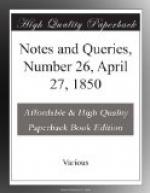A.W.
Vox Populi Vox Dei.—The words “Populi vox, vox Dei,” stand as No. 97. among the “Aphorismi Politici ex Ph. Cominoeo,” in a small volume in my possession, entitled,—
“Aphorismi Politici
et Militares, etc. par Lambertum Danaeum
collecti. Lugduni Batavorum.
CID IDC XXX IX.”
There is no reference given to book or chapter; and, judging from the manner in which the aphorisms of Thucydides and Tacitus (which I have been able to examine) are quoted, I fear it may be found that the words in question are rather a condensation of some paragraph by Des Comines that the ipsissima verba that he employed.
C. FORBES.
Temple.
The Cuckoo.—In respect to the Query of “G.” (No. 15. p. 230.), on the cuckoo, as the Welsh Ambassador, I would suggest that it was in allusion to the annual arrival of Welshmen in search of summer and other employment. As those wanderers may have entered England about the time of the cuckoo’s appearance, the idea that the bird was the precursor of the Welsh might thus become prevalent. Also, on the quotation given by “PETIT ANDRE” (No. 18. p. 283.) of Welsh parsley, or hempen halters, it may have derived its origin from the severity practised on the Welsh, in the time of their independence, when captured on the English side of the border,—the death of the prisoner being inevitable.
GOMER.
Ancient Titles (No. 11. p. 173.).—It may be interesting to your querist “B.” to know that the seal of the borough of Chard, in the county of Somerset, has two birds in the position which he describes, with the date 1570.
S.S.S.
Daysman (No. 12. p. 188., No. 17. p. 267.).—For quoted instances of this, and other obsolete words, see Jameson’s Bible Glossary, just published by Wertheim in Paternoster Row.
S.S.S.
Safeguard (No. 17. p. 267.).—The article of dress for the purpose described is still used by farmers’ wives and daughters in the west of England, and is known by the same name.
S.S.S.
Finkle (No. 24. p. 384.).—means fennel. Mr. Halliwell (Dict. p. 357.) quotes from a MS. of the Nominale, “fynkylsede, feniculum.”
L.
Gourders of Rain (No. 21. p. 335., No. 22. p. 357.).—Has the word “Gourders” any connection with Gourtes, a stream, or pool? See Cotgrave’s Dict., and Kelham’s Dict. of the Norman Language.
Geotere is the A.-S. word for “melter;” but may not the term be applied to the pourer out of anything? Gourd is used by Chaucer in the sense of a vessel. (See Prol. to the Manciple’s Tale.)
C.I.R.
Urbanus Regius (No. 23. p. 367.).—The “delightful old lady” is informed that “Urbanus Regius” (or Urban le Roi) was one of the reformers, a native of Langenargen, in Germany. His works were published under the title of Vitet et Opera Urbani Regii, &c., Norib. 1562. His theological works have been translated into English, as the lady is aware.




